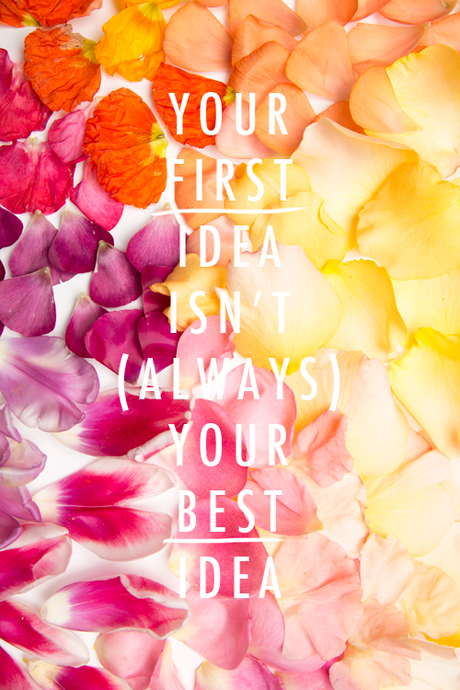
Lately, I've been thinking about my design process--the way I work from concept to final product--and how my time in design school strengthened my work and voice. For me, design school was a formal playground where I was encouraged to think differently and where I was rewarded for it. I really went for it! I've addressed if design school is a good fit for you (read about it here), but today I wanted to start a new series on the blog where I discuss lessons I've learned or am learning in the creative process.
photo by Trisha Zemp
Number one: Your first idea is not your (always) best idea.
Though I went to design school for interior design, I took a few classes in other design studies including a product design course. In this course we worked with an art-focused city in Italy that had been disrupted by an earthquake years ago and still hasn't recovered. We created products that would go in their museum store. The products needed to be inspired by the history of the city. We started out getting to know the city and drawing things that inspired. Slowly we conceived of ideas of products and would discuss them in front of the small class.
Our teacher made sure we didn't jump the gun and immediately dive into a final product, but let our initial drawings take us to a place we hadn't initially expected. In this way, we were relying less on our pre-conceived expectations and more on the full design process, which relies on the progression of ideas. This design process started with an idea that was implemented on paper, then after several rounds committed to pen, then lead to ways those drawings could be formed into a product. Then, we discussed week after week which product was the best avenue for representing the drawings. Finally, we made mock-ups of the product and refined them each week.
I had designed a cutlery set and I remember coming to class with a mock up and finessing it each week to get it just right, making sure that I was thinking of every way in which I was representing the city and implementing good and thoughtful design that was unencumbered by unnecessary details.
At the time, it felt laborious to talk about all the ways our ideas could be realized, but now I see its value. When I first started out with the project, I had a project in mind, but as I dug into my brain and let the pen draw and the mock-ups take shape, I came up with something that I never would have thought of, but something that I knew truly came from me and something that was good. My initial idea was fine, but probably not the best I could do. I'm grateful for a teacher who encouraged me to dig deeper and explore the full design process and not take short cuts.
This leads me to one of the most important lessons I've learned: your first idea is not always your best idea. I notice this particularly when attempting to watch "design" shows on TV that focus on unrealistic challenges in a short amount of time. Oftentimes, the challengers hardly have enough time to implement the challenge so idea time is cut short and not thoroughly thought through. They end up taking the first idea they have and running with it. Sometimes it works, sometimes it doesn't. I find that if the idea is strong from the get go then everything else falls into place.
I suppose this lesson could also be called "The importance of idea conception." Lately, I've been noticing, most likely because of social media and the ability to see everyone's work, a lot of similarities in artist's work. I think it's inevitable and sometimes it's good to draw upon other ideas and build on it. But I also think that our face-paced world discourages us from taking our time in the thinking/ruminating/incubating stage of the design process. I think if we sat down and really dove into what our mind and heart is telling us, our work would take us to a place all our own.

